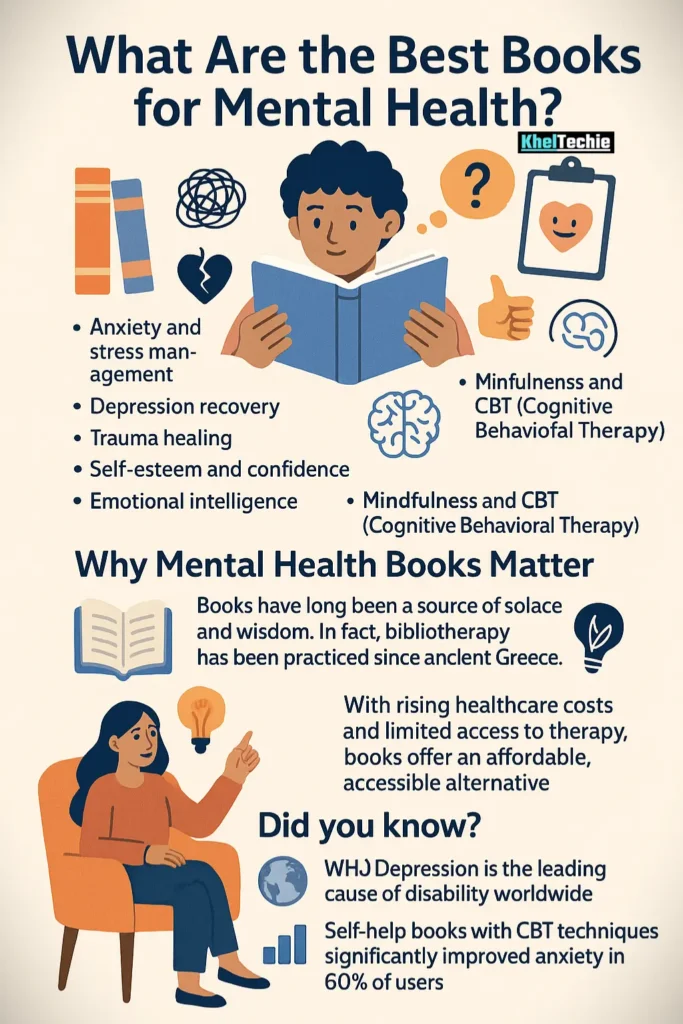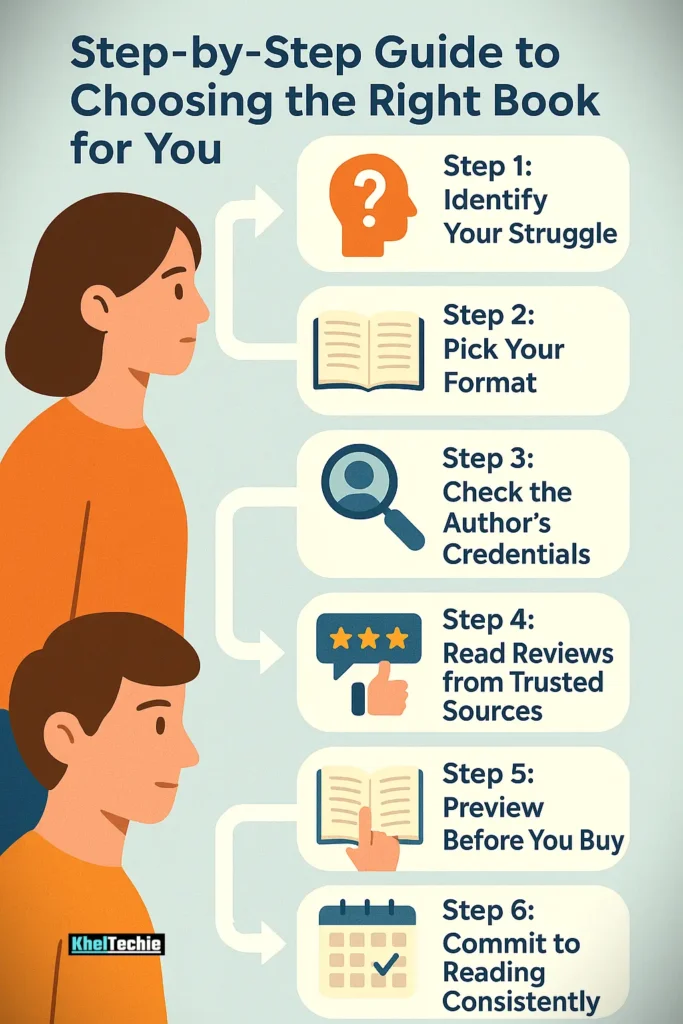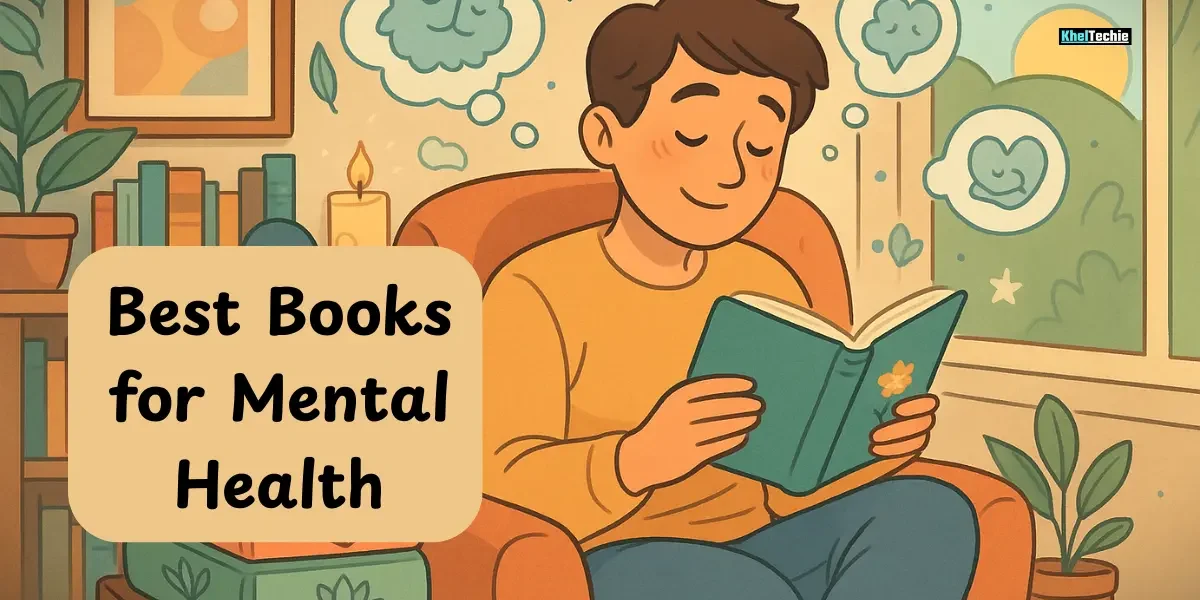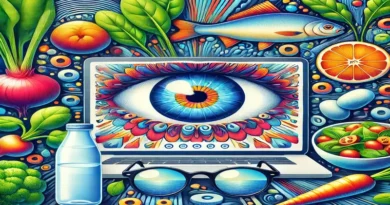Best Books for Mental Health: 21 Life-Changing Reads
Feeling overwhelmed, anxious, or stuck in a negative headspace? You’re not alone. And the right book might just be your best companion.
When Words Heal!
Mental health is no longer a hush-hush topic tucked away in journals or private clinics. In 2025, it’s center stage as it should be. But with thousands of self-help titles out there, how do you find the best books for mental health that actually work?
According to the World Health Organization (WHO) , 1 in every 8 people in the world live with a mental disorder . And while therapy and medication are vital tools, sometimes the right book can offer comfort, clarity, and even a roadmap to healing.
That’s why this guide dives deep into the Best Books for Mental Health , offering expert-backed recommendations, personal insights, and practical strategies to support your emotional well-being. Whether you’re dealing with stress, grief, trauma, or just looking to build resilience, these books might just change your life.

What Are the Best Books for Mental Health?
Imagine a mental toolkit, books that act like a therapist, a friend, or a mirror. That’s what the best books for mental health aim to be. They cover topics like:
- Anxiety and stress management
- Depression recovery
- Trauma healing
- Self-esteem and confidence
- Emotional intelligence
- Mindfulness and CBT (Cognitive Behavioral Therapy)
They aren’t one-size-fits-all, but they all have something in common, they help you understand your mind and give you tools to improve it.
Also read – How to Create a Simple Morning Workout Routine
Why Mental Health Books Matter
Books have long been a source of solace and wisdom. In fact, bibliotherapy , the use of books to help treat mental health conditions, has been practiced since ancient Greece. Today, it’s backed by science
Moreover, with rising healthcare costs and limited access to therapy in many regions, books offer an affordable, accessible alternative or supplement to traditional mental health care.
Did you know?
- According to the WHO, depression is the leading cause of disability worldwide.
- A study by Harvard Medical School found that self-help books backed by cognitive behavioral therapy (CBT) techniques significantly improved anxiety symptoms in 60% of users.
- On Reddit’s r/selfimprovement, over 80% of users cite books as a primary trigger for their mental health journey.
But here’s the thing: not every book hits the mark. Some are just fluff. That’s why I’m sharing only the books I’ve read or seen work for others books with real insights, practical tools, and credible backing.

Step-by-Step Guide to Choosing the Right Book for You
Not all books hit home the same way. Here’s how to pick the one that matches your mental health needs.
Step 1: Identify Your Struggle
Ask yourself:
- Are you overwhelmed daily? (Look into anxiety-specific books.)
- Struggling with motivation or sadness? (Check depression-focused reads.)
- Want better habits? (Habits and productivity books can help.)
Step 2: Pick Your Format
- Audiobooks for emotional storytelling (📱)
- Paperbacks for highlighting key lessons (📖)
- Workbooks for CBT or ACT techniques (✍️)
Step 3: Check the Author’s Credentials
Look for authors who are:
- Licensed psychologists or psychiatrists (e.g., Dr. David Burns, Bessel van der Kolk)
- Certified coaches or counselors
- Researchers in psychology or neuroscience
- Individuals with lived experience sharing authentically
Step 4: Read Reviews from Trusted Sources
Check platforms like:
- Goodreads
- Amazon (look for verified purchases)
- Psychology Today
- Reddit communities like r/selfhelp and r/mentalhealth
Step 5: Preview Before You Buy
Most online retailers allow previews. Skim through the introduction and a few chapters to see if the tone and content resonate with you.
Step 6: Commit to Reading Consistently
Don’t rush. Give yourself time to absorb the material. Try reading a chapter a week and journaling your thoughts afterward.
Top 21 Best Books for Mental Health: Curated for Every Need
| Rank | Book Title | Author | Focus Area |
|---|---|---|---|
| 1 | The Body Keeps the Score | Bessel van der Kolk | Trauma Healing |
| 2 | Feeling Good | David D. Burns | Overcoming Depression |
| 3 | Man’s Search for Meaning | Viktor E. Frankl | Finding Purpose |
| 4 | Maybe You Should Talk to Someone | Lori Gottlieb | Therapy & Self-Acceptance |
| 5 | Atomic Habits | James Clear | Building Healthy Routines |
| 6 | Daring Greatly | Brené Brown | Vulnerability & Courage |
| 7 | Why We Sleep | Matthew Walker | Sleep & Mental Health |
| 8 | Burnout | Emily Nagoski & Amelia Nagoski | Stress Management |
| 9 | Attached | Amir Levine & Rachel Heller | Relationship Anxiety |
| 10 | The Gifts of Imperfection | Brené Brown | Embracing Flaws |
| 11 | Quiet: The Power of Introverts | Susan Cain | Identity & Confidence |
| 12 | The Four Agreements | Don Miguel Ruiz | Personal Freedom |
| 13 | Lost Connections | Johann Hari | Roots of Depression |
| 14 | Radical Acceptance | Tara Brach | Mindfulness & Self-Compassion |
| 15 | Self-Compassion | Kristin Neff | Inner Kindness |
| 16 | How to Win Friends and Influence People | Dale Carnegie | Social Skills |
| 17 | The Happiness Trap | Russ Harris | ACT-Based Living |
| 18 | Mindful Self-Compassion Workbook | Kristin Neff & Christopher Germer | Practical Exercises |
| 19 | The Subtle Art of Not Giving a F*ck | Mark Manson | Perspective Shifting |
| 20 | The Highly Sensitive Person | Elaine N. Aron | Sensitivity & Strength |
| 21 | Grief Works | Julia Samuel | Coping with Loss |
Let’s dive deeper into a few standouts.
Must-Read Picks & Why They Work
1. The Body Keeps the Score – Dr. Bessel van der Kolk
This groundbreaking book explores how trauma affects the body and brain. Van der Kolk combines scientific research with compelling case studies to show how practices like yoga, meditation, and theater can heal trauma. A must-read for anyone recovering from past experiences.
Expert Insight: Quoted in Harvard Review , van der Kolk states, “Trauma isn’t just an event that took place sometime in the past. It is also the imprint left by that experience on mind, brain, and body.”
2. Maybe You Should Talk to Someone – Lori Gottlieb
Written by a therapist who becomes a patient herself, this memoir-style book offers raw honesty about therapy, vulnerability, and healing. It’s both educational and emotionally resonant.
Personal Note: I read this during a difficult breakup. It helped me understand my emotions without judgment and realize that seeking help is a sign of strength, not weakness.
3. Atomic Habits – James Clear
While not strictly a mental health book, Atomic Habits teaches how small changes lead to massive results. It’s perfect for those struggling with motivation, procrastination, or low self-esteem.
Pair habit-tracking with gratitude journaling for double the mental health benefits.
4. Burnout – Emily Nagoski & Amelia Nagoski
This duo of sisters both scientists explains why women often feel overwhelmed and how to complete the stress cycle. Their approach is backed by biology and filled with actionable advice.
Quote That Stuck With Me: “Stress is not the problem. The problem is that we don’t finish the stress response.”
😱 Common Mistakes to Avoid When Reading Mental Health Books
Reading a book won’t magically fix you, but it can shift your mindset. Avoid these pitfalls:
- Thinking it replaces therapy
Books are guides, not doctors. Pair reading with professional help when needed. - Not applying the exercises
Especially in CBT-based books, skipping activities is like skipping the workout but expecting muscles. - Buying too many books at once
Focus on one or two. Mental clarity comes from depth, not quantity. - Choosing based on trends, not needs
Just because a book is hyped doesn’t mean it’s what you need right now. but not substitutes for therapy or medical treatment. - Reading Too Fast
Rushing through content reduces absorption and impact. - Ignoring Red Flags
If a book makes you feel worse, put it down. Not all advice works for everyone. - Not Tracking Progress
Keep a journal to note insights, emotions, and behavioral shifts.
My Personal Experience (By Ashish)
As a wellness writer and health blogger for over 5 years, I can tell you that no single book changed me but several did, piece by piece. I remember being stuck in a cycle of burnout until I read Atomic Habits. Just building one small win daily boosted my mental state.
Then, The Body Keeps the Score taught me things no one ever talks about how trauma shapes the body and brain. It was like a flashlight in a cave.
These books don’t just teach, they transform.
✅ Final Thoughts: Read, Reflect, Repeat
Mental health isn’t a destination. It’s a daily journey. Books won’t cure all your problems, but they’ll help you make sense of them and sometimes, that’s exactly what you need.
So pick up one book. Start there.
And if one page resonates with you? Let that be your sign to keep going.
👉 Got a favorite mental health book that changed your life?
Share in the comments, I’d love to hear your story.
FAQs
What Are the Best Mental Health Books for Beginners?
If you’re new to self-help, start with:
- Maybe You Should Talk to Someone (emotional storytelling)
- The Gifts of Imperfection (gentle self-love)
- Atomic Habits (practical mindset shift)
These are easy to digest and highly relatable.
Can Reading Improve Mental Health?
Yes! Research shows that reading fiction improves empathy , while non-fiction builds coping skills . Reading regularly can reduce stress by 68% , according to a University of Sussex study.
Which Books Help with Anxiety?
Top picks include:
- The Anxiety and Phobia Workbook by Edmund J. Bourne
- The Worry Trick by David Carbonell
- Hope and Help for Your Nerves by Claire Weekes
They provide cognitive-behavioral tools and calming techniques.
Can books really improve your mental health?
Yes—especially those grounded in CBT, ACT, or mindfulness. Books provide insights, coping tools, and emotional validation.
Are There Books for Teen Mental Health?
Absolutely. Recommended titles:
- It’s All Absolutely Fine by Ruby Wax (for teens and adults)
- Reasons to Stay Alive by Matt Haig
- Therapy and the Counterfeit One by Gary John Bishop
Many schools and libraries carry teen-friendly mental health sections
What books do therapists recommend?
Therapists often recommend:
The Body Keeps the Score by Bessel van der Kolk
Feeling Good by Dr. David Burns
The Happiness Trap by Russ Harris
How Do I Know If a Mental Health Book Is Legitimate?
Look for:
- Peer-reviewed references
- Credible author credentials
- Positive reviews from experts
- Balanced, non-dogmatic language
Avoid books promising quick fixes or miracle cures.
What book should I read if I’m overwhelmed?
Try The Gifts of Imperfection or Unwinding Anxiety. Both are accessible and deeply calming.
What Books Help with Depression?
Try:
- Feeling Good by David D. Burns
- Lost Connections by Johann Hari
- Prozac Nation by Elizabeth Wurtzel (memoir style)
These combine science, personal insight, and hope.
Can Books Replace Therapy?
No. While books can support therapy, they shouldn’t replace it entirely. If you’re experiencing severe symptoms like suicidal thoughts or panic attacks, seek professional help immediately.
Can reading be a form of therapy?
It’s called bibliotherapy—using reading as therapeutic support. While not a replacement for a therapist, it’s incredibly helpful.
What Are the Best Mental Health Audiobooks?
Highly rated ones include:
- The Gifts of Imperfection (Brené Brown)
- Atomic Habits (James Clear)
- The Subtle Art of Not Giving a F ck* (Mark Manson)
- The Body Keeps the Score (Bessel van der Kolk)
Perfect for multitasking—listen while walking, commuting, or cooking
Where Can I Find Free Mental Health Books?
Check out:
- Libby or Libro.fm (library apps with audiobooks)
- Project Gutenberg (free public domain books)
- Open Library (free digital library)
- Reddit threads like r/FREEBOOKS or r/selfhelpbooks
Some authors also offer free chapters on their websites.





Pingback: Boost Mood: How To Improve Mental Health With Fitness
Pingback: How To Train Your Brain: 7 Mental Toughness Techniques